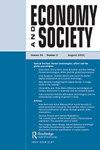有争议的价值:可比性价值争议中的经济专业知识,美国,1979-1989
IF 4.3
2区 社会学
Q1 ECONOMICS
引用次数: 0
摘要
可比价值原则- -要求根据一项职业价值的衡量标准对工资进行普遍的重新调整- -在1980年代初在美国获得了政策动力。最高法院的一项裁决、多项法案、国会听证会以及美国各地妇女和劳工团体提出的一系列倡议,使这场辩论既是一个技术问题,也是一个政治问题。争论的核心在于对公平工资标准和做法的不同看法。从1979年开始的一场全国性运动,到1985年所有美国政府机构宣布这一原则不成立,本文追踪了争论双方的经济论点。在此期间,关于影响薪酬实践的偏见的起源和合理工资确定标准的主流观点发生了根本性的转变:从市场到职业分析师的偏见责任,从官僚程序到市场的理性所在地。我用经济学家在法律和政治听证会上提出的关于科学证据的讨论来记录这种转变。本文描述了科学与政策关系中的三个阶段:首先是政策的科学化,其次是知识主张的政治化,最后是经济知识的武器化。本文章由计算机程序翻译,如有差异,请以英文原文为准。
Contested values: Economic expertise in the comparable worth controversy, USA, 1979–1989
The comparable worth principle – a call for a general readjustment of wages according to a measure of the worth of an occupation – gained policy momentum in the United States in the early 1980s. A Supreme Court decision, multiple bills, congressional hearings as well as an arsenal of initiatives from women and labour groups all over the United States shaped the debate both as a technical as well as a political issue. At the core of the quarrel lie diverse opinions on the criteria and practices of setting fair wages. This paper follows the deployment of economic arguments on both sides of the controversy between the start of a national movement in 1979, and when all US government agencies declared the principle unsound in 1985. The dominant view on the origin of biases affecting pay practices and the criteria for rational wage determination shifted radically over this period: from the market to job analysts for the responsibility of the biases, and from bureaucratic procedures to market for the locus of rationality. I document this shift using discussions about scientific evidence brought by economists in legal and political hearings. The paper describes three moments in the relationship between science and policy: first the scientization of policy, second, the politicization of knowledge claims, and finally, the weaponization of economic knowledge.
求助全文
通过发布文献求助,成功后即可免费获取论文全文。
去求助
来源期刊

Economy and Society
Multiple-
CiteScore
6.30
自引率
5.90%
发文量
23
期刊介绍:
This radical interdisciplinary journal of theory and politics continues to be one of the most exciting and influential resources for scholars in the social sciences worldwide. As one of the field"s leading scholarly refereed journals, Economy and Society plays a key role in promoting new debates and currents of social thought. For 37 years, the journal has explored the social sciences in the broadest interdisciplinary sense, in innovative articles from some of the world"s leading sociologists and anthropologists, political scientists, legal theorists, philosophers, economists and other renowned scholars.
 求助内容:
求助内容: 应助结果提醒方式:
应助结果提醒方式:


